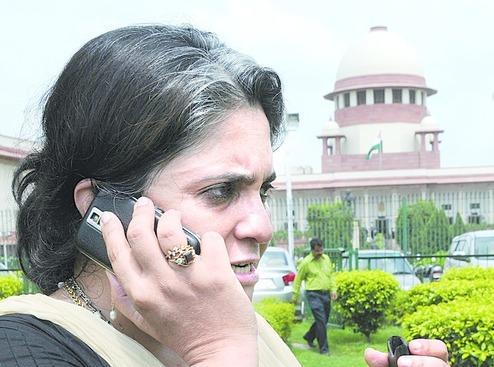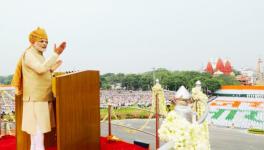The State as Fiefdom
Using the State machinery to settle personal scores is corruption
The Safdar Hashmi Memorial Trust, or Sahmat, is named after a young left-wing theatre activist who was beaten to death by goons while performing a street play in support of striking workers in Sahibabad on the outskirts of Delhi. It is a voluntary organization that brings together artists and intellectuals for the cause of defending secularism and democratic rights. It operates from a little cubbyhole, a garage in one of the Lutyens bungalows in the centre of New Delhi, where pictures of Munshi Premchand and couplets from Kabir adorn the walls above a continuous wooden settee, strewn with cushions, that hugs them.
Upon walking into the cubbyhole one can meet all sorts of people. The ones I have met on different occasions, seated on the settee along the walls, include Ashok Mitra, Irfan Habib, Romila Thapar, Sitaram Yechury, Javed Akhtar, Sharmila Tagore, M.K. Raina, Vivan Sundaram, Ram Rahman, Kumar Shahani, and many others who would be considered celebrities in the world outside of that idyllic little cubbyhole, where equality and camaraderie prevail.
A friend of mine, associated with running Sahmat, was surprised, the other day, when he walked into the cubbyhole to find three rather burly gentlemen waiting for him. They were, it transpired, from the Gujarat police and had come to inquire whether Teesta Setalvad, the social activist, had actually purchased a couple of t-shirts from the Sahmat office as her accounts claimed she had. (Sahmat, I should add, sells a few left-wing books and t-shirts, apart from posters and prints.) They were carrying with them large tomes containing Teesta's accounts and were apparently checking the authenticity of every single transaction recorded there.

Now, it is by no means uncommon for State agencies to check each and every transaction of an individual; indeed the income tax authorities make a habit of doing so, but only of a small random sample of income tax assessees. And in the case of a specific inquiry regarding malfeasance by any individual, each and every transaction relating to that particular inquiry needs, no doubt, to be checked. But Teesta's case falls into neither of these categories. Her name was not chosen at random; and the charges against her, which State agencies are currently pursuing, no matter what their substance, relate to the use of specific funds that were never claimed by her, anyway, to have been spent on buying t-shirts from Sahmat. The conclusion is inescapable that this diligent pursuit by the Gujarat police of each and every transaction of Teesta Setalvad is motivated not by any desire to inquire into the current charges against her, but by a desire both to defame her, by giving wide credence to the idea of her possible criminality, and also to "get her" one way or another, by minutely and industriously checking her entire armour in order to uncover the slightest chink in it.
It is common knowledge that those heading the executive wing of the Indian State have unleashed a vendetta against Teesta Setalvad, and the obvious inference is that this is because of the role she has played in bringing to justice many of the perpetrators of the 2002 post-Godhra pogrom against Muslims in Gujarat. Indeed, so hell-bent have State agencies been in "punishing" Teesta for her temerity in persisting with this agenda that every effort was made to put her and her husband, Javed Anand, behind bars.
It was argued on more than one occasion that their being taken into custody was essential for a proper investigation, but Teesta and Javed offered every co-operation to the investigating agencies and pointed out that in none of the cases involving them was there any scope for intimidating witnesses and tampering with evidence. Mercifully, the courts hitherto have heeded their plea, so that Teesta and her husband continue to remain free. But the nation-wide search by State agencies for chinks in their armour continues unabated.
Such a relentless pursuit by State agencies to nail an individual could, to an extent, be understandable if the individual had been at war against the State itself, in the manner of "terrorist" outfits. But the allegations against Teesta, whatever their substance, relate to financial transactions that were not meant to promote any assault on the Indian State; indeed none has claimed otherwise. All the efforts of the NGO she heads have been directed not against the State but against certain individuals who, she believes, were associated with the 2002 pogrom. These individuals who are now occupying important positions within the State are using the State machinery to settle scores with her. And therein lies the source of one's disquiet.
Everybody agrees that using the State machinery for personal gain constitutes corruption. If one uses a State car for a pleasure trip by one's family, then that constitutes corruption; if one uses one's ministerial prerogative to procure gains for one's kith and kin, or, what comes to the same thing, to procure gains for some people who in turn give one a share of the gains for the favour shown to them, then that constitutes "corruption". But using the State machinery for personal vendetta is no different from these instances; it too must qualify as corruption and must be opposed.
But it is practised on so pervasive a scale in India that we tend to accept it. The typical refrain is, if you dare to annoy the high and mighty then you must be prepared to face the consequences; so, if Teesta Setalvad has dared to take on the sangh parivar activists of Gujarat, whose patron now occupies the leading executive position in the country, then she must be prepared to face the consequences, and there is nothing for us to do in the matter. However, this smug indifference to her fate amounts to a fundamentally anti-democratic attitude, for in a democracy there must be no high and mighty; those holding supposedly high positions are just elected public functionaries, not hereditary potentates.
Those in high positions in the State in other words are no more "high and mighty" in their personal capacity than anybody else. The use of the State machinery for settling personal scores amounts, therefore, to an obliteration of the distinction between the State and the persons who occupy positions in the State qua persons. And the obliteration of this distinction is the essence of corruption, in the sense we understand it. This distinction, however, is crucial for democracy, which is why corruption as a conceptual category acquires meaning only in a democracy. By contrast, in societies where this distinction has not yet come to exist, its obliteration can hardly be considered a crime; in such societies, corruption ceases to be a meaningful category.
A feudal society is characterized by an absence of this distinction, which is why under feudalism there is no corruption in the sense that we understand it. When Louis XIV of France had famously said, " L'état, c'est moi [The State, it is I]", he had underscored the absence of this distinction under feudalism. And it is no surprise that nobody has ever accused Emperor Shah Jahan, who presided over 17th-century Indian feudalism, of corruption on the grounds that he used taxpayers' money for building a monument to his wife.
In other words, the degree to which we make this distinction, between the State and the personal capacity of the persons occupying positions in the State, becomes an index of our progress from feudalism towards democracy. We must insist upon this distinction and hence oppose all obliterations of it, such as when the State machinery is used to settle personal scores, if we are interested in advancing our democracy. That is why opposing the use of the State machinery to hound Teesta Setalvad and settle personal scores against her, is a matter that concerns all of us and must be opposed by all of us.
In Hindi films from Mumbai, there is often a villain who terrorizes innocent people and uses his goons to harass, beat up, or even kill anyone who opposes such terrorizing. Unless we oppose the use of the State machinery for settling personal scores, we not only create the scope for the replication of such terrorizing, and that too through the use of taxpayers' money, but also do so no longer at the local, but at the national, level.
True, the National Democratic Alliance government is not the first one to use the State machinery for settling personal scores. But that cannot be an argument for not opposing the NDA government when it does so. Wrongdoings of the past, whatever these might have been, cannot be made an excuse to turn a blind eye to the wrongdoings of the present.
The author is Professor Emeritus, Centre for Economic Studies, Jawaharlal Nehru University, New Delhi
Courtesy: telegraphindia.com
Disclaimer: The views expressed here are the author's personal views, and do not necessarily represent the views of Newsclick
Get the latest reports & analysis with people's perspective on Protests, movements & deep analytical videos, discussions of the current affairs in your Telegram app. Subscribe to NewsClick's Telegram channel & get Real-Time updates on stories, as they get published on our website.
























